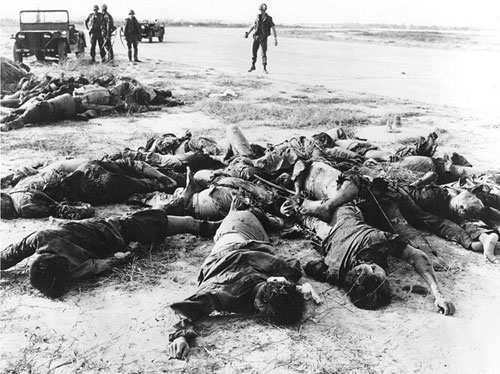Vietnam paid for its unification with a heavy price. At war’s end, there were millions of displaced persons, orphans, widows, handicapped persons and prostitutes, as shown by various official and unofficial estimates; this highlights the massive social problems that must have hit Vietnam. The country’s infrastructure was also much ravaged by the war. Vietnam then sank into a war with Cambodia and later fought with China. The many years of continuous war, coupled with isolation from Western markets, caused massive inflation, still present now, and deterioration of the Vietnamese economy. 1.5 million refugees also left the country in multitudes during the Vietnam War. Besides, US used Agent Orange, a deforestation chemical, in the war, and destroyed much agricultural land. Thus it led to serious starvation in the post- war era. Also, chemicals used by the US in the war led to deformities and illnesses in many Vietnamese.

(bodies of Vietnamese soldiers)
United States
The war was America’s longest war ever. Despite not having experienced a military failure or defeat, the war was still a costly political error for the US. This defeat was caused by various reasons, including a failure to accurately comprehend the nature of events during the war, inaccurate assumptions about Communist policies, a rigid use of ‘containment’ and ‘domino theory’ and other theories, which were to some extent misguided and inaccurate, and led to inappropriate US actions.
The US lost its superior position over the USSR. The war damaged America’s society. Citizens’ confidence in the US army slumped and many veterans became ostracised. America became reluctant to participate directly in hot wars later on, as could be seen in the Soviet Afghan War (1979-89).
The Vietnam War had been one of America’s rare defeats. Another of its more serious consequences was the strain it put on America’s financial capability. The US spent 686 billion US dollars (in 2008 dollars) on the war. The Vietnam War ended the post-WWII economic boom that had persisted for 25 years, when America had provided other nations with the money and resources to rebuild their infrastructure and gotten rich by doing so. As the war escalated the US was forced to increase its military spending by leaps and bounds and to send more soldiers to the battlefield. The spending caused a downwards pull on the US economy and it nosedived from a ~6% growth rate in 1966 to 0% in 1970; a recession followed, which was only ended in the 1980s, which coincided with the next proxy war of the Cold War, the Soviet-Afghan War.

Other states:
Laos: Before the war in Vietnam began, Laos, and not Vietnam, was more of the centre of American attention. With the Communist Pathet Lao fighting against the weak Royal Lao coalition, the US feared that losing Laos would “make it impossible to prevent the rest of Southeast Asia from slipping behind the iron curtain.” Laos became dragged into the war with its involvement with North Vietnam. Laos was extensively bombed by the US during the earlier part of the war. Laos remains today the most bombed nation on earth. Pro-Communist factions overthrew the government in Laos during the war; Laos is now Communist.
Southeast Asia experienced a large flow of refugees from Vietnam and Laos, but mostly turned hem away as their numbers were too large to sustain.
No comments:
Post a Comment